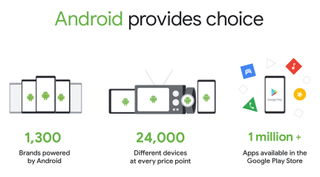Google Hit With $5 Billion Fine

The European Commission has fined Google a record $5 billion over what it says was illegal restrictions on Android device manufactures and mobile operators in violation of EU antitrust rules.

In addition, if Google does not end the practice within 90 days, it faces an additional penalty of 5% of parent Alphabet's daily worldwide revenues. The commission had already preliminarily concluded Google had abused its market position.
Google vowed to appeal the decision, saying it "rejects the business model that supports Android."
Related: GOP Senators Press Google on G-Mail Data Sharing
The commission says Google is dominant in general search, smart phone operating systems and Android app stores and has been trying to keep it that way. Dominance is not an antitrust violation per se, but the commission said Google abused that dominant position by illegally tying its search and app browser apps, making illegal payments, and illegally obstructing competitors' operating systems.
Commissioner Margrethe Vestager, who heads up competition policy, said Google had used Android as a way to insure traffic on mobile devices went through the Google search engine in an effort to "cement" its search dominance, preventing competitors from innovating and competing on the merits of their products.
The commission found that Google:
Broadcasting & Cable Newsletter
The smarter way to stay on top of broadcasting and cable industry. Sign up below
"Required manufacturers to pre-install the Google Search app and browser app (Chrome), as a condition for licensing Google's app store (the Play Store);
"Made payments to certain large manufacturers and mobile network operators on condition that they exclusively pre-installed the Google Search app on their devices;
"Prevented manufacturers wishing to pre-install Google apps from selling even a single smart mobile device running on alternative versions of Android that were not approved by Google (so-called "Android forks")."
The fine is in addition to the $2.7 billion fine levied against Google by the EC in June 2017 for abusing its search dominance by favoring its own comparison shopping service.
Google Defends Its Turf
"The decision ignores the fact that Android phones compete with iOS phones, something that 89 percent of respondents to the Commission’s own market survey confirmed," blogged Google CEO Sundar Pichai. "It also misses just how much choice Android provides to thousands of phone makers and mobile network operators who build and sell Android devices; to millions of app developers around the world who have built their businesses with Android; and billions of consumers who can now afford and use cutting-edge Android smartphones."

The Computer & Communications Industry Association, whose members include Google, found the decision "paradoxical" and "problematic" "for a competition authority to go after a company that has been one of the main pro-competitive forces in the mobile economy," It said the commission appeared to underestimate the "fierce" competition with Apple's iOS operating system.
“Today’s decision punishes the most open, affordable and flexible operating system in the mobile ecosystem," said CCIA president Ed Black. "Android brought more competition, innovation, and consumer choice to the market. These are precisely the things competition authorities are tasked to promote rather than jeopardize.”
The Information Technology & Innovation Foundation called the decision misguided and shortsighted. "Google’s investment in the Android mobile operating system has created enormous value for consumers, developers, and device makers," said ITIF VP Daniel Castro.
"We’re glad to see Europe vigorously enforce its antitrust laws," said John Bergmayer, senior counsel at Public Knowledge. "Dominant firms should not use their control in one market or product to gain unfair advantages in others. While we do not know all the facts of this specific case, in general, interoperability, compatibility, and affordable options for consumers must not come at the cost of competition."
“Today’s decision by the European Commission to fine Google over $5 billion and require significant changes to its business model to satisfy EC bureaucrats has the potential to undermine competition and innovation in the United States,” said Sen. Mike Lee (R-Utah). “Moreover, the decision further demonstrates the different approaches to competition policy between U.S. and EC antitrust enforcers. As discussed at the hearing held last December before the Senate’s Subcommittee on Antitrust, Competition Policy & Consumer Rights, U.S. antitrust agencies analyze business practices based on the consumer welfare standard. This analytical framework seeks to protect consumers rather than competitors. A competitive marketplace requires strong antitrust enforcement. However, appropriate competition policy should serve the interests of consumers and not be used as a vehicle by competitors to punish their successful rivals.”The new chairman of the Federal Trade Commission said a a Hill hearing Wednesday (July 18) that one of the things the agency was reviewing was that consumer welfare standard.
Contributing editor John Eggerton has been an editor and/or writer on media regulation, legislation and policy for over four decades, including covering the FCC, FTC, Congress, the major media trade associations, and the federal courts. In addition to Multichannel News and Broadcasting + Cable, his work has appeared in Radio World, TV Technology, TV Fax, This Week in Consumer Electronics, Variety and the Encyclopedia Britannica.

